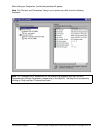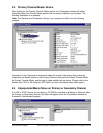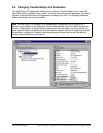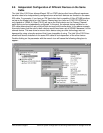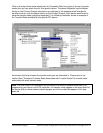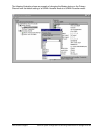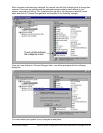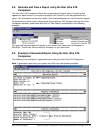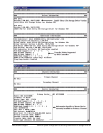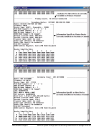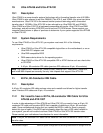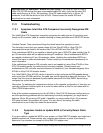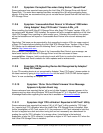
Intel Customer Support Common System Configuration Issues using Intel® Ultra ATA Storage Driver 34
10. Ultra ATA/66 and Ultra ATA/100
10.1 Description
Ultra ATA/66 is a newer transfer protocol technology with a theoretical transfer rate of 66 MB/s.
Ultra ATA/66 is also referred to as Ultra DMA/66, Fast ATA-2, and UDMA-4 by some hard drive
manufacturers. Ultra ATA/100 is the newest transfer protocol technology with a theoretical
transfer rate of 100 MB/s. Ultra ATA/100 is also referred to as Ultra DMA/100 and UDMA-5.
Ultra ATA/66 and Ultra ATA/100 is backwards compatible with earlier Ultra ATA/33 and DMA
technology, and with existing EIDE/IDE hard drives and CD-ROM drives. Please contact your
computer manufacturer or place of purchase to determine if your system supports Ultra ATA/66
or Ultra ATA/100.
10.2 System Requirements
To use Ultra ATA/66 or Ultra ATA/100, your system must meet ALL of the following
requirements:
• Ultra ATA/66 or Ultra ATA/100 compatible logic either on the motherboard, or on an
Ultra DMA PCI adapter card
• Ultra DMA compatible BIOS
• DMA-aware device driver for the operating system
• Ultra ATA/66 or Ultra ATA/100-compatible IDE or ATAPI device such as a hard drive
or CD-ROM
• A 40 pin, 80-conductor IDE cable (previous IDE cables are 40 pin, 40-conductor)
Note: The Intel® 810E2, Intel® 815E, Intel® 815EM, Intel® 815EP, Intel® 820E, Intel® 850,
and Intel® 860 chipsets are currently the only Intel chipsets that support Ultra ATA/100.
11. 40 Pin, 80-Conductor IDE Cable
11.1 Description
A 40 pin, 80-conductor IDE cable reduces noise and crosstalk and allows for higher transfer
rates. Previous IDE cables are 40 pin, 40-conductor.
11.2 Do I need to have a 40 Pin, 80-conductor IDE Cable for Ultra
ATA/66 and ATA/100?
In order to take advantage of Ultra ATA/66 and Ultra ATA/100 you need to have a 40 pin, 80-
conductor IDE cable and a system BIOS that is capable of detecting a 40 pin, 80-conductor
cable. Some motherboards require that you update the BIOS in order for them to properly
detect this type of cable. If the BIOS cannot properly detect the type of IDE cable installed in
your system, you will not be able to achieve Ultra ATA/66 or Ultra ATA/100 transfer rates.
Please contact your motherboard manufacturer for more information.
Note: A 40 pin, 40-conductor IDE cable can be used but it will limit the device to Ultra ATA/33
transfer rates.



